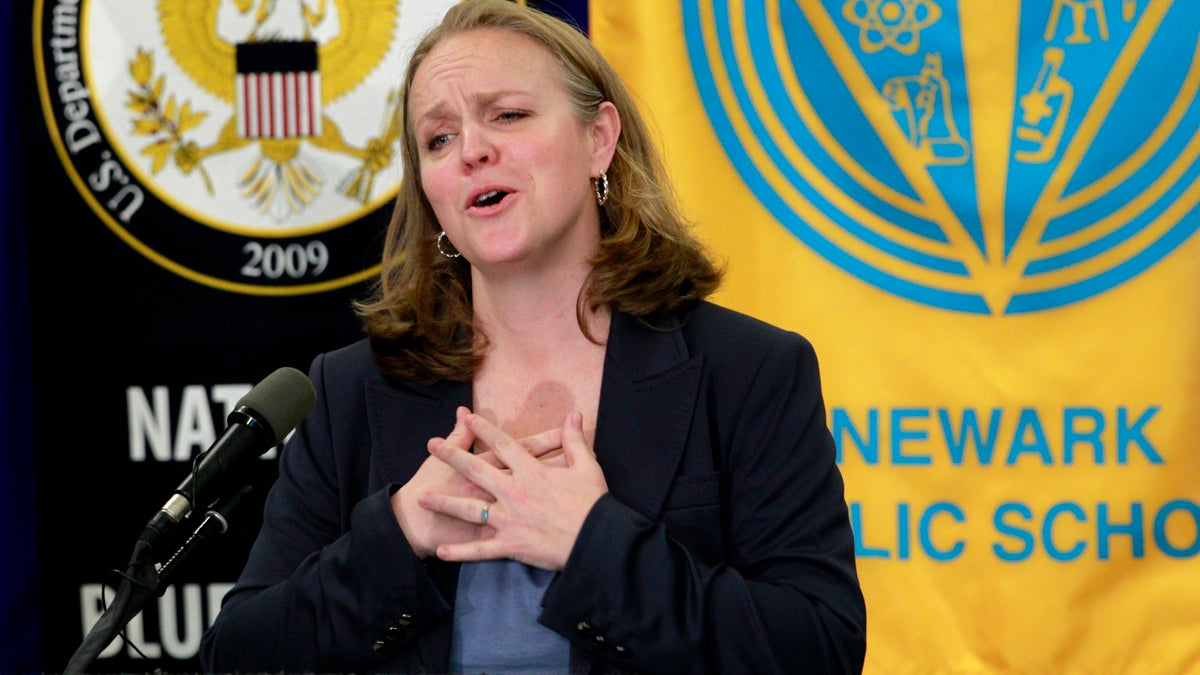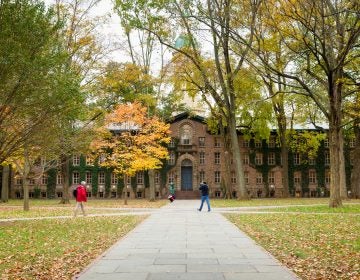School reform efforts in Newark offer lessons for Camden

Cami Anderson, after she was named to head Newark's public schools on May 4, 2011. (AP Photo/Julio Cortez)
If Newark Public Schools is a metric for the strength of the education reform movement in New Jersey, call us anemic.
Wednesday local media trumpeted student protests over Superintendent Cami Anderson’s “One Newark” plan, which includes school closings, consolidations, and a universal enrollment system for charters and traditional schools. Mayor-Elect Ras Baraka, who made his antipathy towards school reform the centerpiece of his campaign, has called for Anderson’s resignation and a moratorium on all initiatives.
Former Newark mayor (now U.S. senator) Cory Booker told Dale Russakoff in last week’s New Yorker that Newark’s residents were justifiably “fearful and angry” at the prospect of radical change: “My mom—she would’ve been fit to be tied with some of what happened.”
Down south, Camden City Public Schools faces a similar set of educational and fiscal challenges: decades of poor student outcomes, shrinking enrollment as families continue to choose charter schools over traditional district schools, budget deficits, and staff cuts. Superintendent Paymon Rouhanifard has proffered his own strategic plan, “The Camden Commitment,” and tempers are starting to rise.
For Camden, Newark provides a teachable moment. What lessons can be gleaned from Newark’s missteps? How can the district implement necessary reforms without igniting community ire?
Here’s a short lesson plan.
1. Relentlessly reach out to the community:Newark got this all wrong. Despite a Facebook-funded public relations campaign, outreach efforts have been perceived as condescending and disingenuous. The Fund for Newark’s Future, which managed the $100 million school reform grant from Mark Zuckerberg and another $100 million in matching contributions, promised to appoint a community advisory panel but didn’t get it around to it for two years. Five principals were abruptly fired, and then reinstated, validating residents’ fears of fickle and ill-conceived changes. Anderson’s decision to boycott School Board meetings, albeit after a personal attack, confirmed community sentiment that the Administration was weak and disinclined to accrue stakeholder buy-in.
Camden, to its credit, is already trying to get this most important piece right. In his first hundred days as superintendent, Rouhanifard visited all of Camden’s 26 schools, held four community town halls, and hosted eight focus groups with parents, students, and teachers. This week during a student protest about teacher lay-offs, he sat and listened to participants and began a series of fifteen meetings with students and staff members. (That protest, and the one scheduled for Wednesday, was organized by Save Camden Schools and led by Camden resident Gary Frazier, a member of the anti-charter organization Save Our Schools-NJ. Here’s his mug shot.)
Rouhanifard and his staff must continue to focus on building relationships with students and families. A Newark lesson: education reform only works if it’s a cooperative venture.
2. Fiscal and Strategic Transparency:Newark’s woes, ironically, stem in part from Facebook’s largesse. All that cash and nothing but outrage. “Where’d the money go?” crowds chant. From the New Yorker piece:
“[M]ore than $20 million of Zuckerberg’s gift and matching donations went to consulting firms with various specialties: public relations, human resources, communications, data analysis, teacher evaluation. Many of the consultants had worked for Joel Klein, Teach for America, and other programs in the tight-knit reform movement, and a number of them had contracts with several school systems financed by Race to the Top grants and venture philanthropy. The going rate for individual consultants in Newark was a thousand dollars a day. Vivian Cox Fraser, the president of the Urban League of Essex County, observed, ‘Everybody’s getting paid, but Raheem still can’t read.'”
Camden must open its books. There’s nothing to hide but sins from the past, well before Rouhanifard’s tenure, and information is power. Share that power with Camden residents. For example, not many people know that before Rouhanifard’s appointment 3,500 Camden students — one in four — already were enrolled in charter schools. Not many people know that the “Camden Commitment” proposes no school closings. Not many people know that 45 percent of the recently-announced lay-offs were Central Office administrative and clerical positions, including 30 percent of positions that made $100,000 or more. Not many people know that before the lay-offs the ratio of employees to students was 1:4.
Show everyone where the money goes.
3. Value incremental progress.
Much of the reform community espouses the urgency of swift change. But reckless action can undermine even the most beneficial structural shifts. For example, Cami Anderson’s decision to challenge N.J.’s tenure law and seek a waiver to lay off teachers in order of classroom effectiveness instead of seniority was a community relations debacle, especially with teacher union leaders who had already agreed to a merit pay clause in their new contract. Abrupt closures of valued, if poorly-performing, schools was another misstep, as was an over-emphasis on charter school expansion. (In fairness, that emphasis was bundled with the Facebook money.)
Camden officials must balance the urgent educational needs of students with a deep respect for the sanctity of neighborhood traditional schools. Strategic plans don’t preclude adaptations to new ideas and timelines can include a little breathing room. Shavar Jeffries, who lost the Newark mayoral race largely because of the backlash against education reform, remarks to Russakoff, “this is a democracy. A majority of people support these ideas. You have to build coalitions and educate and advocate.”
___________________________________________
Laura Waters is president of the Lawrence Township School Board in Mercer County. She also writes about New Jersey’s public education on her blog NJ Left Behind. Follow her on Twitter @NJLeftbehind.
WHYY is your source for fact-based, in-depth journalism and information. As a nonprofit organization, we rely on financial support from readers like you. Please give today.





